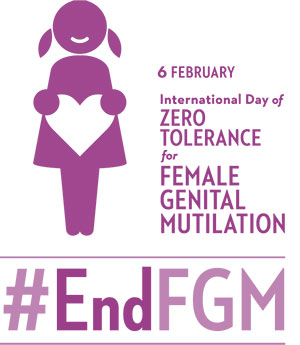UNAAV Events
International Day of Zero Tolerance for Female Genital Mutilation, 6 February

Female genital mutilation (FGM) comprises all procedures that involve altering or injuring the female genitalia for non-medical reasons and is recognized internationally as a violation of the human rights of girls and women.
It reflects deep-rooted inequality between the sexes, and constitutes an extreme form of discrimination against women and girls. The practice also violates their rights to health, security and physical integrity, their right to be free from torture and cruel, inhuman or degrading treatment, and their right to life when the procedure results in death.
To promote the abandonment of FGM, coordinated and systematic efforts are needed, and they must engage whole communities and focus on human rights and gender equality. These efforts should emphasize societal dialogue and the empowerment of communities to act collectively to end the practice. They must also address the sexual and reproductive health needs of women and girls who suffer from its consequences.
UNFPA, jointly with UNICEF, leads the largest global programme to accelerate the abandonment of FGM. The programme currently focuses on 17 African countries and also supports regional and global initiatives.
Theme 2016 “Achieving the new Global Goals through the elimination of Female Genital Mutilation by 2030.”
The 17 goals – known as the Sustainable Development Goals, or simply the Global Goals – aim to transform the world over the next 15 years. They build on the success of the Millennium Development Goals, global objectives adopted in 2000 that have helped to improve the lives of millions of people around the world.
UNFPA is working with governments, partners and other UN agencies to directly tackle many of these goals – in particular Goal 3 on health, Goal 4 on education and Goal 5 on gender equality – and contributes in a variety of ways to achieving many of the rest.